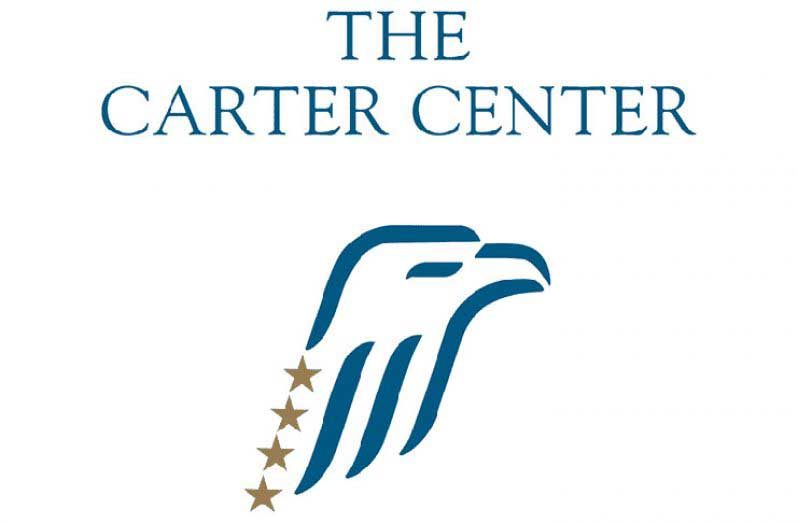–urges all parties to sign code of conduct
AHEAD of Guyana’s September 1 General and Regional Elections, the Carter Center election observation mission has highlighted progress but has also raised concerns especially regarding the Guyana Elections Commission (GECOM).
In a pre-election statement, the Carter Center said following meetings with various stakeholders, it has observed key pre-election activities, including nomination day and a series of campaign launches and campaign events, as part of its effort to assess electoral preparations and the political environment in Guyana in advance of the polls.
Guyana heads into this new election cycle with a reformed legal and electoral framework, which is aimed at improving transparency in the vote tabulation process and modernising voter registration, the observer mission noted.
But while the Carter Center observers have welcomed the changes, concerns remain over several elements and more importantly, what it dubbed limited communication from GECOM.
The statement highlighted that Guyana’s legal and electoral framework has undergone important reform since the country’s last national election in 2020, particularly in the areas of tabulation and voter registration.
The Carter Center said the most substantial changes include subdistrict tabulation in select regions; new requirements for simultaneous electronic public posting and transmission of polling station results; obligations of presiding officers to ensure transparency during the closing and counting procedures; designated cycles for continuous registration; the end of “house-to-house” registration; and updated requirements for removal of the deceased from the voter list.
“In addition, these changes to the legal framework are not well understood by Guyana’s civil society and some opposition political parties,” the observers mission noted.
Further, amendments to the Representation of the People’s Act have paved the way for tabulation to now take place at 17 locations across Guyana’s 10 electoral districts.
Also, sub-district returning officers will oversee the process in Regions Three, Four, and Six, where most of the electorate resides.
The amendments provide for the immediate online publication of Statements of Poll (SoPs) and tabulation forms, and the electronic display of each SoP during the tabulation process, the statement further outlined.
The amendments reinforce the rights of party agents to observe all stages of the process and outlined severe penalties for violations, including non-compliance with the new provisions, such as failing to publish information, delivering false information, not providing certified copies to superiors, or obstructing party agents.
“While these changes could provide greater transparency, The Carter Center calls on GECOM to publish detailed tabulation procedures for the public as soon as possible,” the statement read.
The 2025 Official List of Electors (OLE), certified on July 29, contains 757,690 names- 376,703 men and 380,987 women.
The Carter Center further stated: “While the relative size of the OLE raises concerns for many Guyanese, The Carter Center has not received evidence of inflation of the voter roll.”
Moreover, the observer mission also reported on the recent code of conduct agreement developed by Guyana’s Ethnic Relations Commission (ERC), in which parties committed to peaceful campaigns, avoidance of hate speech and ethnically divisive rhetoric, and prioritisation of the nation over any political party.
“The Carter Center notes that two political parties, A Partnership for National Unity (APNU) and Forward Guyana Movement (FGM), have not signed the code of conduct. The Center calls on all parties to sign the code and to commit to its principles, which reflect the laws of Guyana and recognised international standards for democratic elections.
“The Carter Center further calls on all political parties to abide by Guyanese law and international standards for democratic elections in avoiding hate speech and encouraging peaceful political participation of all party supporters” the observer mission said.
The Carter Center also addressed the topic of bank account closures of WIN candidates, describing the move by financial institutions as “overcompliance.”
OFAC recently reaffirmed that non-U.S. persons could face sanctions if found providing material support to the sanctioned Mohamed family, as a result of the far-reaching consequences of their designation under the Global Magnitsky Human Rights Accountability Act.
This was outlined in a document, which was OFAC’s response to queries from the WIN camp following the closure of candidates’ bank accounts.
The document, which was leveraged by Stabroek News and Kaieteur News for articles in their Sunday edition, made it clear that transactions with sanctioned individuals are generally prohibited for U.S. persons, and non-U.S. entities are not immune from repercussions.



.jpg)









